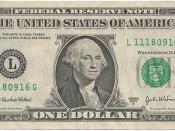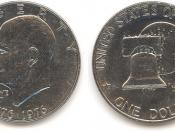The U.S. Dollar - � PAGE �1� -
The U.S. Dollar
in a Modern Global Economy
(1)
ECON
Your University
The 'Almighty Dollar'! Given the state of our current economy, that statement holds far less true than it did twenty, ten, or even five years ago. The dollar has slipped and slid and gradually fallen with consistency for the past five-plus years, save for a negligible stint of appreciation in 2005. The emergence of the 'global economy' in the late Twentieth Century has placed an extraordinary amount of dependency, ergo volatility, on U.S. currency. As we were so proud to take claim as the most modern and industrialized country in the world less than a century ago, now we must take the reigns, as so many other economies are so heavily reliant on our success.
The value of the United States Dollar is ever-changing. World currencies are bought and sold on the open market daily, which accounts for their inherent fluidity.
The reasons for these fluxuations are many, and far too complex to cover in entirety here, so lets take a look at the most prevalent factors:
Many foreign states purchase and hold foreign money in reserve to hedge against monetary peaks and valleys. They do this for the same reason an individual investor would diversify his or her portfolio to protect their investments against a sharp decline in a certain industry. In many instances, the reserves kept in U.S. Dollars constituted the majority of a countries holdings. Obviously, the steady decline in value did not sit well with them! To protect their interests, these countries are slowly and steadily replacing their holdings with currencies that are faring better in exchange (currently the monies of choice are the British Pound and the Euro). This loss of foreign confidence further contributes...


